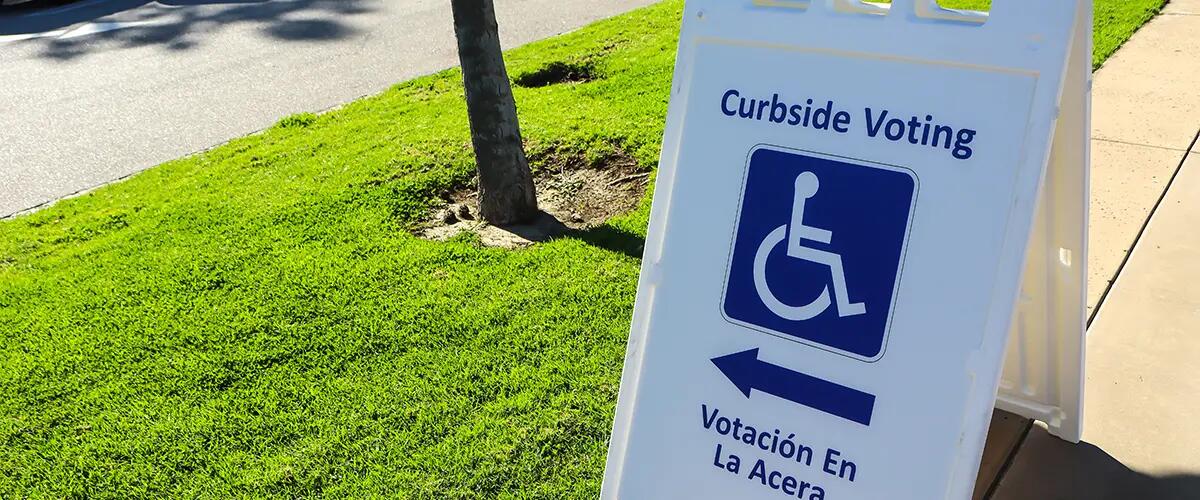
Photo Illustration: Getty Images
U.S. Election Assistance Commission releases report conducted in partnership with Rutgers
WASHINGTON, DC – The U.S. Election Assistance Commission (EAC) – in partnership with Rutgers University –released a new report examining how the Help America Vote Act (HAVA) impacted the voting experiences of voters with disabilities, since enacted in 2002. In 2020, an estimated 38.2 million people with disabilities were eligible to vote. In 2024, this is expected to rise to above 40.2 million with an updated estimate expected from Rutgers later this year. The EAC worked with researchers from the Program for Disability Research in the School of Management and Labor Relations at Rutgers University to complete the report.
The reports and other information for “Voting Experiences Since HAVA: Perspectives of People with Disabilities” can be found on the EAC’s website.
The research reveals that since its passage, HAVA has improved the voting experiences of people with disabilities and that it can be used to continue to address the difficulties people with disabilities face when voting. Other key findings include:
Turnout of voters with disabilities has increased since HAVA was adopted.
- In 2000, turnout of people with disabilities was 16.8% lower than that of people without disabilities.
- This gap in voter turnout shrank to 11.3% in 2020.
- Despite this decrease in the disability voter turnout gap, people with disabilities remain less likely to vote than people without disabilities, in part because of the voting difficulties discussed in this report.
Accessibility of polling places has improved significantly over the last 20 years.
- Participants with vision disabilities feel the availability of accessible voting machines has improved over the past 20 years.
- Parking spaces for people with disabilities and the inclusion of ramps have made polling places more accessible for those having difficulty walking long distances or navigating steps.
- There is also greater adoption of accessible voting systems in polling places, mail-in voting, and accessible ballot delivery and return.
The researchers, which included Professor Mason Ameri of Rutgers Business School, used qualitative data from six focus groups of 44 voters with disabilities to examine their perspectives on their voting experiences, and how their experiences have changed over time. The report also presents quantitative data from national surveys on voter turnout and accessibility to provide context for exploring the focus group discussions.
“Ensuring accessibility for voters with disabilities and protecting the right to casting a private and independent ballot has been a priority for the agency since it was established,” said EAC Chairman Ben Hovland. “As this report demonstrates, in the 22 years since the passage of HAVA, significant progress has been made to improve accessibility for voters with disabilities. The EAC will continue to support state and local election officials as they work to improve accessibility of the voting process in the 2024 elections and beyond.”
Through HAVA, the EAC is tasked with maintaining a clearinghouse of election administration information. To fulfill this mission, the EAC provides best practices recommendations, training materials, and other resources for election officials. This includes an on-demand video series that was designed to assist election officials in identifying and remediating common accessibility barriers, including some of those highlighted in this report.
“Understanding the voting experience for people with disabilities is crucial to addressing the challenges many have faced,” said EAC Vice Chair Donald Palmer. “This report is an important addition to the years of research the EAC and Rutgers University have done to inform improvements to voting accessibility. Efforts like this and our continued support of election officials through accessibility training and resources help achieve the EAC’s mission to ensure an independent and private vote for all.”
This report builds on joint EAC/Rutgers reports published in 2023, 2022, and 2021. The EAC’s partnership with the Rutgers Program for Disability Research has provided rich data and important insights that will guide the development of resources that meet the voting needs of people with disabilities.
“Examining the experiences of voters with disabilities alongside data on voter turnout and accessibility allows us to see both the substantial progress that has been made to improve voting accessibility, as well as the barriers that still exist,” said Professor Lisa Schur, Co-Director of the Rutgers Program for Disability Research. “Our findings on the impact of HAVA reveal that it remains imperative for state and local election offices to invest in careful preparation and programming to ensure that citizens with disabilities can exercise their right to vote.”
The full report and additional resources for “Voting Experiences Since HAVA: Perspectives of People with Disabilities” can be found on the EAC’s website.
The U.S. Election Assistance Commission (EAC) was established by the Help America Vote Act of 2002 (HAVA). It is an independent, bipartisan commission charged with ensuring secure, accurate, and accessible elections by developing guidance to meet HAVA requirements, adopting voluntary voting system guidelines, and serving as a national clearinghouse of information on election administration. The EAC also accredits testing laboratories and certifies voting systems, as well as administers the use of HAVA funds. For more information, visit www.eac.gov.
The Rutgers School of Management and Labor Relations (SMLR) is the world’s leading source of expertise on managing and representing workers, designing effective organizations, and building strong employment relationships. SMLR’s Program for Disability Research studies the economic, social, and political inclusion of people with disabilities.
Contact:
Kristen Muthig
Phone: 202-897-9285
Email: kmuthig@eac.gov
Press: For all media inquiries see our Media Kit


